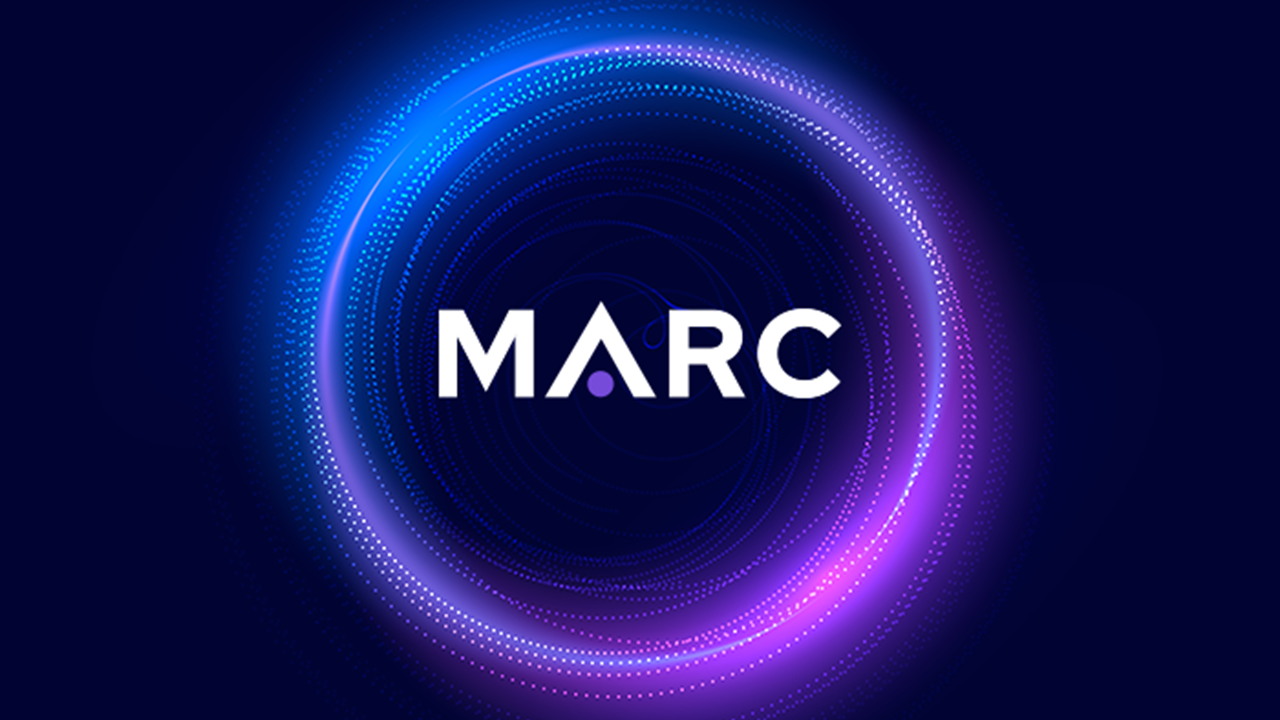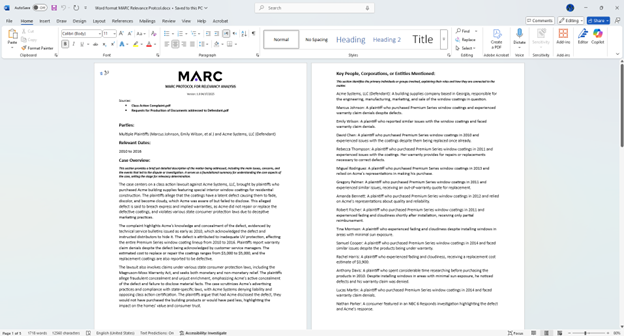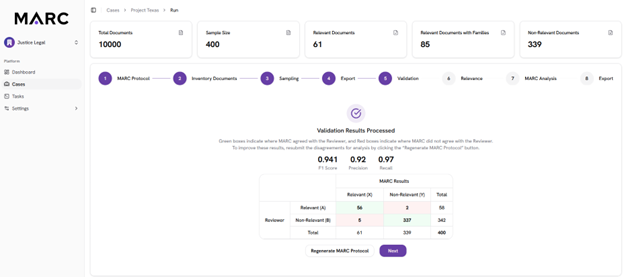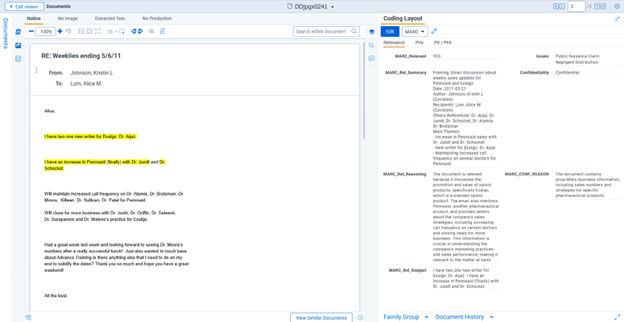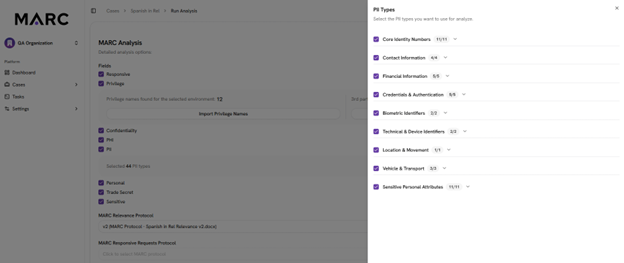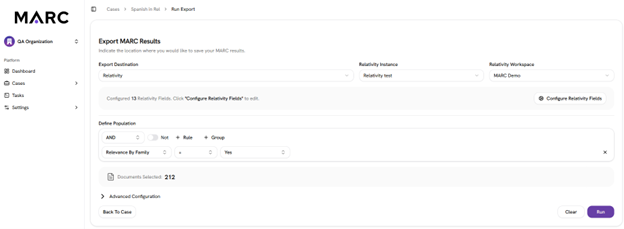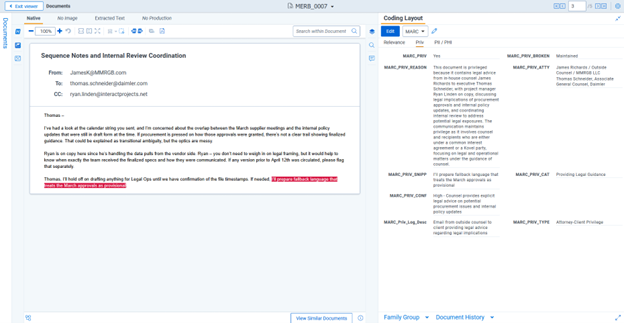The legal technology company Altorney today announced the general availability of MARC, a generative AI-powered document review system designed to automate first-pass review decisions before documents enter traditional review platforms.
After first announcing MARC last March and going through a pilot period with corporate legal departments, the company is now releasing the product for general availability to corporate legal teams, litigation service providers and law firms.
The Problem MARC Addresses
The product tackles a core inefficiency in e-discovery workflows: organizations typically load entire document sets into expensive review platforms, only to cull large portions as non-responsive. Shimmy Messing, Altorney’s CEO and co-founder, says this approach creates unnecessary costs and security risks.
“If you’re loading your million documents into a review platform, as an example, and then immediately culling out 800,000 of them for not hitting keywords or not being part of TAR or whatever, you still have these 800,000 documents sitting there in your database that you’re paying for and that are exposed from a risk factor after leaving your corporate environment,” Messing said during a demonstration of the product for LawSites.
MARC’s approach is to automate the culling and initial review decisions before documents reach the review platform, ideally within the organization’s own environment. This means only relevant documents – already tagged with first-pass decisions on issues like privilege, confidentiality and responsiveness – are loaded into expensive hosting platforms.
How MARC Works
MARC operates as a text analytics tool that sits between data collection and the review platform. The system is agnostic about which large language model (LLM) it uses. Organizations can deploy MARC with Altorney’s provided Llama model installed locally, or integrate it with their preferred approved models, including those from Azure or OpenAI.
MARC can operate entirely within an organization’s firewall, with no data transmitted externally. “All the data can stay there,” Messing said. “Nothing has to go out to OpenAI or Azure AI – it can all be contained in a local environment.”
This approach provides security while also reducing costs, as local LLMs avoid the per-token charges associated with cloud-based AI services.
Rachi Messing, Altorney’s co-founder, said that installation typically requires just 30-40 minutes of IT time, after which the system is largely self-managing.
Protocol Analysis, Not Prompt Engineering
Among MARC’s distinguishing features is its deliberate avoidance of requiring prompt engineering by users.
Rather than requiring users to craft precise prompts – a skill Rachi Messing described as “really hard to master” and prone to inconsistency – MARC uses what it calls a “protocol analysis” approach.
With this approach, users upload background materials about a case into a folder. These materials might include complaints, subpoenas, counterclaims, pleadings, or even informal documents like an email from in-house counsel outlining a new matter or an HR complaint in an internal investigation.
MARC then generates a comprehensive protocol document in Microsoft Word format. This protocol includes:
- Identification of all parties involved.
- Relevant date ranges.
- An overview of the matter.
- Key individuals and their roles.
- Relevant technologies and products.
- Different themes of the case.
- Specific issues to identify within the dataset.
Attorneys can then edit this Word document directly, adding missing individuals, removing irrelevant parties, narrowing overly broad themes, or adjusting other parameters.
The edited protocol is uploaded back into MARC, which then uses it as the foundation for all subsequent analysis.
This approach keeps the workflow in familiar territory for legal professionals, Rachi Messing said. “There’s no reason we need attorneys to become prompt engineers, but they love editing Word docs.”
Processing and Validation
Once the protocol is finalized, MARC can ingest data from multiple sources: text files on a file system, Microsoft Purview exports from M365, or directly from Relativity databases. The system includes an integration that allows users to point MARC at specific saved searches within Relativity without actually moving the data.
MARC’s results can be verified through a sampling and validation workflow. The system automatically determines the statistically valid sample size needed, analyzes those documents according to the protocol, and tags them as relevant or not relevant at a low per-document cost.
These sampled documents can be pushed to Relativity or exported via load file for attorney review. Once attorneys validate the sample, their decisions are compared against MARC’s determinations. If discrepancies exist, the system can regenerate the protocol, analyzing what needs to change to correctly classify the disputed documents without affecting already correct decisions.
This iterative process continues until the legal team is satisfied with MARC’s performance. Then the full dataset is processed, at a rate of over one million documents per 24 hours.
Deep Analysis Capabilities
Beyond simple relevance determinations, MARC can perform multiple types of analysis in a single pass, all included in a single additional cost. These analyses include:
Privilege Review: MARC analyzes documents for attorney-client privilege and work product protection, providing reasoning for each determination, identifying parties involved, noting whether privilege was potentially waived by third-party involvement, assigning confidence levels, and automatically generating privilege descriptions suitable for privilege logs.
PII and PHI Detection: The system identifies personally identifiable information and protected health information with granular control over what types to flag. Users can specify, for example, that they only want to identify financial information and health information while ignoring personal email addresses or phone numbers. MARC performs entity analysis, associating information across a document even when, for instance, a person’s name appears on page two and their Social Security number on page seven.
Issue Coding: The system can tag documents according to case-specific issues defined in the protocol.
Confidentiality Analysis: MARC evaluates documents for confidentiality designations, including trade secrets and other sensitive business information.
Hot Document Identification: The system can flag potentially significant documents requiring priority review.
Foreign Language Processing: MARC automatically translates and summarizes documents in foreign languages, allowing English-language protocols to analyze non-English documents and providing summaries in English for reviewers.
Output and Transparency
For every document it processes, MARC provides not just a decision but also its reasoning. In the demonstration, one example showed MARC tagging a document as not relevant. Its explanation detailed that, although the document mentioned UV protection technology, which could potentially make it relevant, it concerned exterior paint rather than interior window coatings, making it irrelevant to the specific case.
This transparency serves multiple purposes. It allows legal teams to understand and validate the AI’s decision-making process, provides documentation for defensibility, and helps identify where the system might need refinement through protocol adjustments.
Documents are also enriched with summaries and, for relevant documents, snippets highlighting the most pertinent portions. All this information can be exported or integrated directly back into Relativity.
Cost Savings and Predictability
Altorney says that in the pilot program testing of MARC, users saw significant efficiency gains.
The company highlighted one Fortune 500 company case involving more than 200,000 documents where MARC achieved 62% review cost savings and 78% hosting cost savings. The company claims an 80% reduction in documents transferred to hosted review platforms and an 86% reduction in cycle time compared to traditional review.
Its costs are also predictable with a high degree of precision, the company says. In one proof-of-concept with 30,000 documents, Altorney provided the customer with a budget estimate of $2,500. The actual cost came in at $2,506 – a level of budget predictability the customer’s AI team said they had never before had with an AI-based product.
Rachi Messing emphasized that beyond cost savings, the technology addresses human inconsistency in review. “You give the same document to four different attorneys and you’ll come out with four different decisions.”
In tests comparing MARC’s decisions to completed human reviews, customers found that discrepancies often revealed human reviewers had been either over broad or over narrow, allowing them to tune MARC to find what they actually needed.
An Expanding Market
When Altorney initially launched MARC in March, it focused exclusively on corporate legal departments for behind-the-firewall deployment.
The reasoning for that limited focus was both technical and strategic. The company believed that culling should happen within the corporate environment before data leaves for external review platforms, reducing both costs and security risks.
However, the market quickly pushed the company to expand its approach. Some corporate customers expressed strong interest in using the product but indicated that internal security and IT approval processes could take up to two years.
These customers asked to host MARC at their preferred litigation service providers, which would enable them to accelerate deployment while still achieving cost savings from reduced data volumes.
Once the LSPs were on board and began using the product, they wanted to also be able to use it with their law firm customers. That led Altorney to open the platform to law firms.
“We’ve now opened it up and a lot of LSPs and law firms are hopping on board and have it installed in their environments as well,” Shimmy Messing said.
Pricing Model
MARC uses volume-based pricing with two tiers. The initial relevance determination costs just pennies per document or less.
Additional analysis – including privilege, confidentiality, issue coding, PII, PHI and other determinations – is also priced at a single per-document rate of just a few cents, depending on volume.
Notably, organizations can rerun analyses without additional charges if requirements change, such as modifications to a confidentiality order.
Humans in the Loop
Despite the automation, Altorney emphasizes that MARC is designed to keep humans involved in the review process.
“GenAI doesn’t eliminate the need for human oversight – but it enables the right human to be in the right place at the right time to optimize their value,” said Stephen Goldstein, the company’s chief product officer.
Rather than replacing human reviewers entirely, Altorney’s vision for MARC is to transform first-pass review into quality control review, allowing reviewers to then work two to three times faster on a smaller set of more important documents.
Shimmy Messing acknowledged that while some users might eventually feel comfortable producing documents straight from MARC without human review, most currently prefer having “eyes on everything,” using MARC’s determinations to accelerate rather than replace human judgment.
‘The Ultimate Truth Seeker’
Altorney was founded by brothers Shimmy and Rachi Messing in late 2021. The company initially focused on its Altorney platform, a marketplace for document reviewers and legal talent, which launched at Legalweek in 2022.
MARC emerged from a collaboration with Goldstein, now the chief product officer and formerly global director of practice support at Squire Patton Boggs. Last year, he approached the Messings with work he’d been doing on using gen AI for first-pass review.
After evaluating his technology, they decided to productize it, spending the latter half of 2024 and early 2025 developing MARC into a commercial product.
The product name honors the founders’ late father, Marc Messing, an attorney, rabbi and educator who died of pancreatic cancer in 2021. Shimmy Messing described him as “the ultimate truth seeker,” making the name appropriate for a tool designed to find truth in document sets.
Both founders have extensive backgrounds in the e-discovery industry, having both started their careers at Merrill Corporation in the early 2000s.
With MARC now generally available, Shimmy Messing told me, Altorney positions itself as a “boutique coding shop” creating “elegant, unconventional legal software” that addresses persistent pain points in legal work – first with legal talent sourcing through its Altorney platform, and now with AI-powered document review through MARC.
 Robert Ambrogi Blog
Robert Ambrogi Blog